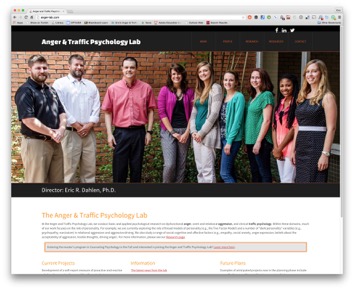
Director: Eric R. Dahlen, Ph.D.
Congratulations to Dr. Emily Prather
12/17/15 About

It is fairly common for current doctoral students to have a hard time imagining that there will be a day when they reach the end of their graduate training. I certainly remember feeling that way. But like Emily just showed us, it really does happen. The classes, examinations, and dissertation writing do not last forever.
It was great to see Emily again for commencement and meet her family. Congratulations to Emily on the completion of her doctorate! Please stay in touch and let us know what is next for you.
Niki Knight Defends Master's Thesis
11/02/15 Aggression
Niki Knight successfully defended her master's thesis today, The HEXACO and Dark Triad in Relational Aggression. Niki examined the HEXACO model of personality and Dark Triad (i.e., narcissism, psychopathy, and Machiavellianism) as predictors of proactive and reactive peer relational aggression in a college student sample.
With regard to the HEXACO model, the factors of Honesty-Humility and Agreeableness were positively associated with proactive and reactive relational aggression in peer relationships. Machiavellian, narcissistic, and psychopathic traits were positively associated with reactive relational aggression; narcissistic and psychopathic but not Machiavellian traits were positively associated with proactive relational aggression. Taken together, Niki's results supported the utility of both the HEXACO model and the Dark Triad constructs in predicting peer relational aggression among college students.
Niki is a doctoral student in her third year of the program and will soon begin work on her dissertation.
Congratulations to Niki on a successful defense!
With regard to the HEXACO model, the factors of Honesty-Humility and Agreeableness were positively associated with proactive and reactive relational aggression in peer relationships. Machiavellian, narcissistic, and psychopathic traits were positively associated with reactive relational aggression; narcissistic and psychopathic but not Machiavellian traits were positively associated with proactive relational aggression. Taken together, Niki's results supported the utility of both the HEXACO model and the Dark Triad constructs in predicting peer relational aggression among college students.
Niki is a doctoral student in her third year of the program and will soon begin work on her dissertation.
Congratulations to Niki on a successful defense!
Caitlin Clark Proposes Dissertation
10/01/15 Aggression
Caitlin Clark successfully proposed her dissertation today, an ambitious instrument development project aiming to validate a new self-report measure of relational aggression, the Young Adult Relational Aggression Scale (YARAS). Our hope is that the YARAS will ultimately prove to be a psychometrically sound means of assessing proactive and reactive relational aggression among emerging adults.
Many of the existing measures one finds in the adult relational aggression literature were adapted from measures developed with children and early adolescents. Others were developed for use in individual studies and have little evidence of reliability or validity. Still others are difficult to obtain because they were never published, have different versions without clear instructions for use, or do not distinguish between the proactive and reactive functions of relational aggression. Our hope is that the YARAS will be able to improve upon these and other limitations of existing instruments.
Caitlin is an advanced doctoral student working in the Anger and Traffic Psychology Lab who is in the process of applying for a predoctoral internship this year. With her successful dissertation proposal, she will soon be able to begin data collection.
Congratulations to Caitlin on completing this important milestone!
Many of the existing measures one finds in the adult relational aggression literature were adapted from measures developed with children and early adolescents. Others were developed for use in individual studies and have little evidence of reliability or validity. Still others are difficult to obtain because they were never published, have different versions without clear instructions for use, or do not distinguish between the proactive and reactive functions of relational aggression. Our hope is that the YARAS will be able to improve upon these and other limitations of existing instruments.
Caitlin is an advanced doctoral student working in the Anger and Traffic Psychology Lab who is in the process of applying for a predoctoral internship this year. With her successful dissertation proposal, she will soon be able to begin data collection.
Congratulations to Caitlin on completing this important milestone!
Daniel Deason Proposes Dissertation
09/26/15 Aggression
Daniel Deason, an advanced doctoral student who will be applying for a predoctoral internship this year, successfully proposed his dissertation yesterday. He will soon be able to begin his data collection.
Despite evidence that relationally aggressive behaviors can cause problems for emerging adults, little is known about the nature of relational aggression among persons who identify as lesbian, gay, bisexual, or transgender (LGBT). Daniel's dissertation, Hypermasculine, antifeminine: The role of masculine identity in relational aggression among gay men, will examine relational aggression and victimization in the peer relationships of gay men using Exclusively Masculine Identity Theory (EMIT; Kilianski, 2003). Specifically, he aims to test a model derived from EMIT in which adherence to masculine ideology is examined as a potential moderator of the predicted relationship between an index of participants' sex stereotypically and their report of relational aggression and victimization.
Congratulations to Daniel on presenting a complex proposal so clearly!
Despite evidence that relationally aggressive behaviors can cause problems for emerging adults, little is known about the nature of relational aggression among persons who identify as lesbian, gay, bisexual, or transgender (LGBT). Daniel's dissertation, Hypermasculine, antifeminine: The role of masculine identity in relational aggression among gay men, will examine relational aggression and victimization in the peer relationships of gay men using Exclusively Masculine Identity Theory (EMIT; Kilianski, 2003). Specifically, he aims to test a model derived from EMIT in which adherence to masculine ideology is examined as a potential moderator of the predicted relationship between an index of participants' sex stereotypically and their report of relational aggression and victimization.
Congratulations to Daniel on presenting a complex proposal so clearly!
Panel on Relational Aggression at MPA
09/21/15 Aggression
Caitlin Clark, Daniel Deason, Niki Knight, and Ashley Morrison presented a panel discussion on relational aggression last week at the 66th Annual Convention of the Mississippi Psychological Association in Bay St. Louis. The panel, Relational aggression among young adults, defined relational aggression and provided examples of proactive and reactive functions of the behavior, reviewed several popular misconceptions about relational aggression and the relevant research literature, addressed the limitations of our knowledge about relational aggression among emerging adults, and examined treatment options for reducing relationally aggressive behaviors.
Congratulations to Caitlin, Daniel, Niki, and Ashley on a job well done!
Congratulations to Caitlin, Daniel, Niki, and Ashley on a job well done!
David Boudreaux Defends Dissertation on New Measure of Attitudes Toward Anger Management
08/25/15 Anger

It is hoped that this measure will ultimately provide clinicians will a tool for assessing client perceptions of anger management. Now that we know something about how the measure works with college students, the next phase of development will likely involve data collection in non-college and clinical samples.
David recently started his predoctoral internship at the James A. Haley Veterans Hospital in Tampa, FL. He had very positive things to say about his experience so far and recommended this site to future students interested in VA internships.
Congratulations, David!
Lab Welcomes New Master's Students
07/30/15 About

Congratulations to Taylor and Michael on their admission to the master's program! We are looking forward to their arrival in Hattiesburg.
Upgrading Our Lab Space
07/01/15 About
Almost a year ago, we gained some lab space that we share with Dr. Madson's College Alcohol Research Team. Now that we have had this space for some time, we are developing a better sense of what we might do with it in the future and how to make it even more useful.
Over the summer, I was able to replace our ancient lab computer with a newer one that should be far more usable since it can run current software and connect to the Internet. I think we could also use this computer as a central hub for storing shared resources (e.g., electronic copies of journal articles, examples of successful IRB proposals, completed theses and dissertations, electronic copies of research questionnaires).
Dr. Madson and I are hoping to clear out some of the unnecessary furniture soon and hope to make some additional upgrades in the months ahead.
Over the summer, I was able to replace our ancient lab computer with a newer one that should be far more usable since it can run current software and connect to the Internet. I think we could also use this computer as a central hub for storing shared resources (e.g., electronic copies of journal articles, examples of successful IRB proposals, completed theses and dissertations, electronic copies of research questionnaires).
Dr. Madson and I are hoping to clear out some of the unnecessary furniture soon and hope to make some additional upgrades in the months ahead.
Lab Welcomes Skylar Hicks
05/06/15 About

Skylar completed her bachelor's degree in psychology at the University of New Orleans, where she worked in Dr. Monica Marsee's Youth Social and Emotional Development Lab. She has been working as a research associate in the Department of Psychiatry at the LSU Health Sciences Center. Her interest and experience in overt and relational aggression make her an excellent fit for the lab.
Congratulations to Skylar on her admission! We are looking forward to working with you in Hattiesburg.
New Look for Lab Website
04/27/15 About

I have updated the software I used to develop and maintain the website (Rapidweaver) to the most current version, and I am using a new design template from ThemeFlood. As time permits, I hope to add more pictures and try to streamline the organization of the site a bit.
If you encounter any problems or find things that are not working as they should, please let me know.
Emily Prather Defends Dissertation on Anger and Binge Eating
04/16/15 Anger
Emily Prather successfully defended her doctoral dissertation yesterday at the University of Southern Mississippi, Predictors of Binge Eating in College Women. Emily's study evaluated the relationships among four theoretically relevant factors hypothesized to predict subclinical binge eating in a sample of college women: trait anger, anger suppression, impulsivity, and emotion regulation.
Emily started by confirming the four-factor structure of the UPPS Impulsivity Scale (Whiteside & Lynam, 2001) through confirmatory factor analysis. Multiple measures of impulsivity have been used in the literature, and the UPPS is one of the newer ones. Given that there has been some disagreement over the optimal factor structure, it was important to make sure that the four-factor structure of this measure would be confirmed in this sample. After confirming this factor structure, Emily found that the urgency and lack of perseverance factors predicted binge eating. Urgency was a hypothesized predictor, but the utility of perseverance was unexpected and suggests that the role of impulsivity in binge eating may be somewhat broader than previously thought.
Trait anger predicted binge eating over and above general negative affect, suggesting that there seems to be something about one's propensity to experience angry feelings that may be particularly useful in understanding binge eating. The tendency to suppress anger in an unhealthy manner also predicted binge eating, and both anger suppression and emotion regulation partially mediated the relationship between trait anger and binge eating. It appears that anger management and the development of emotion regulation strategies may be worth exploring for college women with subclinical binge eating.
Emily is currently completing her predoctoral internship at Wellspan Behavioral Health in York, PA. She recently accepted a postdoc position with Wellspan to begin this summer.
Congratulations, Emily!
Emily started by confirming the four-factor structure of the UPPS Impulsivity Scale (Whiteside & Lynam, 2001) through confirmatory factor analysis. Multiple measures of impulsivity have been used in the literature, and the UPPS is one of the newer ones. Given that there has been some disagreement over the optimal factor structure, it was important to make sure that the four-factor structure of this measure would be confirmed in this sample. After confirming this factor structure, Emily found that the urgency and lack of perseverance factors predicted binge eating. Urgency was a hypothesized predictor, but the utility of perseverance was unexpected and suggests that the role of impulsivity in binge eating may be somewhat broader than previously thought.
Trait anger predicted binge eating over and above general negative affect, suggesting that there seems to be something about one's propensity to experience angry feelings that may be particularly useful in understanding binge eating. The tendency to suppress anger in an unhealthy manner also predicted binge eating, and both anger suppression and emotion regulation partially mediated the relationship between trait anger and binge eating. It appears that anger management and the development of emotion regulation strategies may be worth exploring for college women with subclinical binge eating.
Emily is currently completing her predoctoral internship at Wellspan Behavioral Health in York, PA. She recently accepted a postdoc position with Wellspan to begin this summer.
Congratulations, Emily!
Paper on Parenting and Relational Aggression Published
03/16/15 Aggression
Our latest paper on relational aggression is now available in the Journal of Aggression, Maltreatment & Trauma. The full citation is below. Congratulations to Caitlin!
Clark, C. M., Dahlen, E. R., & Nicholson, B. C. (2015). The role of parenting in relational aggression and prosocial behavior among emerging adults. Journal of Aggression, Maltreatment & Trauma, 24, 185-202. doi: 10.1080/10926771.2015.1002653
Clark, C. M., Dahlen, E. R., & Nicholson, B. C. (2015). The role of parenting in relational aggression and prosocial behavior among emerging adults. Journal of Aggression, Maltreatment & Trauma, 24, 185-202. doi: 10.1080/10926771.2015.1002653
David Boudreaux Matches at Tampa VA
02/20/15 About
Today is APPIC Phase I Match Day, the day when doctoral students in applied psychology programs who have applied for predoctoral internships learn whether they have matched with internship sites. David Boudreaux has matched at the James A. Haley Veterans Hospital in Tampa, FL.
Congratulations, David!
Congratulations, David!
Developing a Measure of Relational Aggression
01/08/15 Aggression

Our new measure aims to assess general/peer relational aggression and romantic relation aggression on separate scales and to permit each type of relational aggression to be divided into proactive and reactive functions. For example, a relational aggressive behavior like spreading a malicious rumor about a friend behind his or her back could be proactive (i.e., unprovoked, planned, done for gain) or reactive (i.e., done out of anger or in response to provocation, unplanned, impulsive). We also included items designed to measure electronic forms of relational aggression, a dimension important to college students but not found in existing measures.
Instrument development is usually a length and complex endeavor. We started by conducting a literature review in order to make sure we had a clear definition of relational aggression. We then developed an initial item set on the basis of focus groups with college students and a review of existing measures appropriate to either adolescents or adults. The focus groups were especially useful because they revealed some important limitations of existing measures and provided us with ideas for relevant content that had not occurred to us. After several rounds of revising items, we submitted our item set to several experts on relational aggression. We revised the item set again based on the input of the expert reviewers. Now we are close to completing the step of administering the new items along with a few existing measures of relational aggression and related constructs to a large sample of college students. This will allow us to examine the factor structure of the item set, reduce the number of items while maximizing reliability, and examine the concurrent and discriminant validity of the resulting measure.
While we hope to complete this phase of the project this semester, many additional steps will remain. In fact, we are planning for the next few steps to be carried out as Caitlin Clark's dissertation. We will be at this project for awhile, but we hope to end up with a measure that has some useful advantages over the option currently available.
